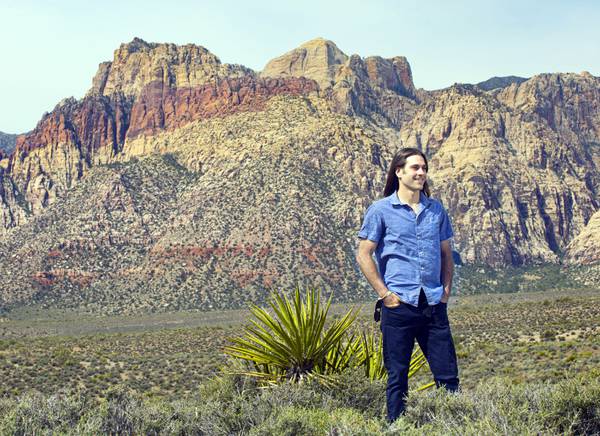With some of the best natural walls in the world at Red Rock Canyon, Mount Charleston and beyond, Las Vegas is home to some major rock climbing talent. As a resident of the Valley since 2013, David Allfrey is one of them. The North Face-sponsored pro climber has accomplished many feats, set speed records and established new climbing routes.
In one noteworthy achievement, which he likens to running a marathon a day for a week, Allfrey and partner Alex Honnold climbed seven full-length routes on Yosemite’s El Capitan in seven days.
Allfrey is skilled at many types of climbing, including icy and alpine terrain. He’s also one of the few contemporary climbers pushing the needle on aid climbing, a discipline in which a climber uses ropes and other equipment to help oneself up the mountain.
“Dave’s probably one of the best aid climbers in the world,” Honnold says. “We’ve done a handful of speed records together on El Cap, and it’s always a good time. He’s great to climb with.”
The two have wildly different schedules, but when they’re both in the same city, they climb together as often as possible. And then, because it’s impossible to resist ribbing his friend on his good looks, Honnold adds, “he has the most handsome hair in climbing.”
Bill Ramsey, a local climber and vice president of the Southern Nevada Climbers Coalition, describes Allfrey as “a real badass.” The two spent a summer scaling walls together in Colorado, and Ramsey came away from the experience impressed by Allfrey’s adventurous spirit and all-around kindness. Given that the latter quality is somewhat rare in the ego-driven world of extreme sports, Ramsey makes sure to note that Allfrey is the real deal.
“He’s from the old school where you develop your big wall skills in Yosemite, then take those skills to the most remote walls in the world, in some of the scariest and loneliest places on the planet; places like Pakistan, Baffin Island, the jungles of Central America. I get scared just looking at some of his pictures of his climbs,” Ramsey says.
A dual life with complementary skills
There’s a good reason that climbing is associated with a “dirtbag” lifestyle in which outdoorsy types live in their vans and drift between mountains. Some devotees consider near-homelessness a sign of dedication.
Those not interested in that must take on side gigs, however. “Most pros don’t make enough to live on, so they do other stuff like coaching or guiding,” says Ramsey, who moonlights as a UNLV philosophy professor.
Allfrey likes to joke that if pro climbing paid as much as other pro sports, he’d be set. But rock climbing isn’t like other sports. Climbing is a pursuit that connects the practitioner with nature, which by definition is distant from paying spectators.
The most famous and financially successful of all climbers right now is probably Honnold, who once told The New Yorker he earns about as much as an orthodontist.
So while Allfrey is the proud owner of a van, he wanted a more stable life for himself, his wife, Carmen Johnson, and their newborn son, Dean Cross Allfrey. He found that stability by following in his father’s footsteps, opening a business called Desert Vista Window Washing last year.
Growing up, Allfrey and his two brothers helped their father, Bill, with his window-washing pursuits in San Jose, California.
Bill says he “takes the blame” for getting his son into climbing and that “speed and efficiency” in cleaning has helped Allfrey develop as an athlete.
“He just took that into his climbing. Being efficient in climbing and the fewer wasted movements could speed up your time and put you in a new style of climbing,” Bill Allfrey says. “So, yeah, I’m proud of him. I really am.”
In addition to carrying on a family tradition, Allfrey’s business continues a local tradition—before climbing pioneer Richard Harrison died in 2014 at age 60, he ran a window-cleaning business for more than 20 years. According to Rock and Ice magazine, Harrison pioneered more than 100 routes in Southern Nevada and was a member of the legendary ’70s era climbing crew the Stonemasters.
Not bad footsteps for Allfrey to follow.
Mile-high work ethic
In Kyrgyzstan, Allfrey and his three climbing partners succeeded in setting a new free climbing route on a 3,100-foot-plus wall in the Ak Su Valley. It’s the hardest route in the region, according to Allfrey. It took them 11 days.
Despite the late summer season, the weather at 12,000-14,000-feet elevation was already cold. The team faced up to 65 mph winds, temperatures in the teens and intermittent snow flurries. “It was just absolutely frigid,” Allfrey recalls.
As they ascended, they cleaned the wall and removed loose rock that might pose a danger. At one point, they even cleared a rock slightly larger than a mini fridge from its precarious position on a ledge.
“We just [put our] noses to the grindstone, got down to work and got it done,” he says. “Putting up a new route like that is a lot of work. … With four of us, there were always two people putting the rope higher, higher, higher. We were grinding.”
The new climb, “The American Way,” is rated at a level of 13a, which is challenging but doable for advanced climbers. “It’s such a wild rock climb. Hopefully, it’ll become something that people want to go all the way to the other side of the globe to try and climb,” Allfrey says.
As to how the feeling of summiting a mountain compares with finishing a window-washing job, Allfrey says they’re “definitely different feelings,” but they both produce a sense of accomplishment, pride in the quality of work done and happiness with the way it all turned out. “I always loved walking away from the house and thinking, ‘That place looks so much better right now.’ ”
This story originally appeared in Las Vegas Weekly.

